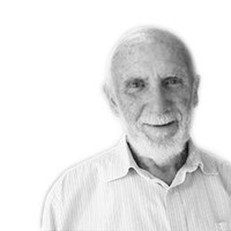
It is with deep sadness that we note the passing of Dr Raymond Bunker who made significant contributions to planning education, research and practice in Sydney, Adelaide and Canberra over seven decades.
Ray hailed from the British Midlands where he gained an M.A. in Geography at the University of Birmingham in 1952 and after National Service with the Royal Navy subsequently worked as a town planning assistant in Newport and Swindon. By the late 1950s he was married with two young children and had successfully studied part-time to become a member of the Royal Town Planning Institute.
In 1959 he was appointed to a lectureship at Sydney University, sailing
from Southampton with his young family in time to commence teaching in 1960 in
the Diploma of Town and Country Planning course established by Professor Denis
Winston. The position helped cover the gap left by the departures of Peter
Harrison and Walter Abraham. Ray became active in the Sydney Division of the Australian
Planning Institute (later RAPI then PIA) and enrolled in a PhD. His completed
dissertation on ‘Metropolitan Growth, Function and Land Use’ in 1967 was
reportedly the first doctorate in planning awarded in Australia. His book Town
and Country or City and Region? was published by Melbourne University Press
in 1971. At Sydney University he was promoted to Senior Lecturer and Associate
Professor and was Acting Head of Department in 1974.
After gaining senior planning experience as a part-time Commissioner with the then NSW State Planning Authority hearing planning appeals, Ray opted to leave academia in 1975 to join the federal Department of Urban and Regional Development (DURD) established by the Whitlam Government as First Assistant Secretary of the Strategy Division. Within months Whitlam was dismissed, DURD disestablished, and Ray was appointed head of the Research Directorate of the Fraser Government’s new Department of Environment, Housing and Community Development.
Leaving the Commonwealth public service in 1978, Ray joined the South Australian Institute of Technology (SAIT) as head of the planning program, replacing the late Tom McKenna, and serving in that role until 1981 when he stood down, battered by an onerous workload and internecine university politics. He remained at SAIT throughout the 1980s, returning to research and during these years published several significant reports on urban consolidation as well as co-editing Urban Australia: Planning Issues and Policies (1987) with Stephen Hamnett. When the Institute was incorporated into the University of South Australia in 1991 Ray was promoted to the rank of Associate Professor, a position that he held until retirement in 1994.
During his time at Sydney University and SAIT/UniSA, Ray’s international engagements were extensive. He variously held visiting positions at the University of Birmingham, University of Cambridge, and the Tavistock Institute of Human Relations, contributed to UN projects in Nairobi and Singapore, and was a consultant to the OECD in Paris in 1991.
Ray was also a significant contributor to the planning profession in South Australia. Among high level public appointments, he was appointed as part-time Chairman of the South Australian Planning Commission and its successor the Development Assessment Commission between 1988 and 1996. He was Advisor to the South Australian Government on the Multifunction Polis project, a significant contributor to the South Australian Planning Review (1990-1992) as a member of its expert reference group and Chairman of the South Australian Committee on Climate Change in 1991-1993. He served as Vice-President of the State Division of RAPI and as President in 1981-1983. With his good friend Alan Hutchings, he co-edited With Conscious Purpose: A History of Town Planning in South Australia, published by Wakefield Press and RAPI in 1986 (and launched by Don Dunstan, the former premier of South Australia). This important and pathbreaking work became required reading for planning students and remains a valuable source of information for anyone seeking to understand South Australia’s planning history. Ray became a Life Fellow of PIA in 1994.
After his retirement, Ray and wife Hazel moved to Bowral in the NSW Southern Highlands to be closer to family. His final years were spent in Canberra. Moving back east, he continued his research interests in South Australian history and produced an original book-length piece of historical fiction Settlers and Spoilers (2002) on the founding of Adelaide. He also maintained active engagement in contemporary research and practice through Visiting Senior Research Fellow positions at the Urban Frontiers Program at the University of Western Sydney (1999-2004) and then with City Futures Research Centre at UNSW (two appointments between 2004 to 2021) headed by Bill Randolph. In these appointments he continued to undertake major research projects, several supported by ARC grants, into planning and urban development issues and maintained a substantial output of high-level scholarly publications, with various collaborators particularly related to Sydney’s metropolitan planning and housing. He leaves an enduring legacy of quality publications on a spectrum of planning issues in journals such as Australian Planner, Urban Policy and Research, Planning Perspectives, Planning Practice and Research and International Planning Studies.
Over a long life Ray Bunker contributed immensely to the culture of planning scholarship and efficacy of planning practice at a high level from the early 1960s. He was popular with planning students and with his colleagues and in later years became a greatly valued mentor to younger researchers with whom he worked and from whom he elicited great affection. He was softly but firmly spoken, immensely knowledgeable and with a mischievous sense of humour, enhanced by the occasional glass of red. Over an illustrious career, Ray made an enormous contribution to planning policy, research and education in Australia and beyond. He will be sorely missed.